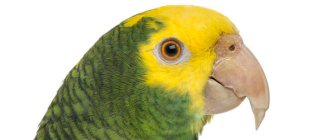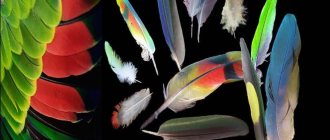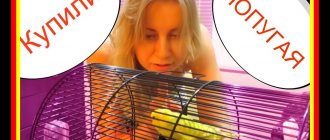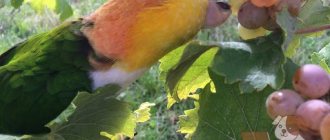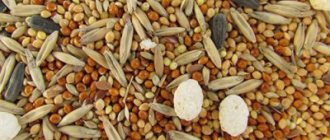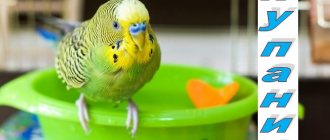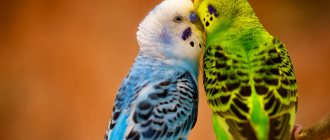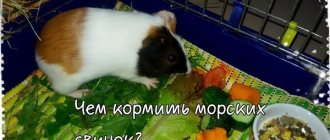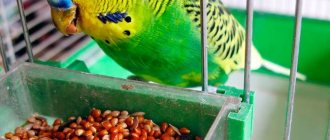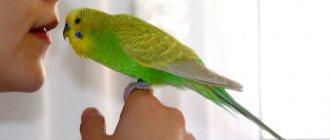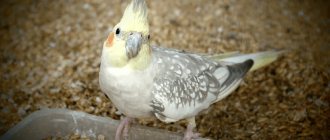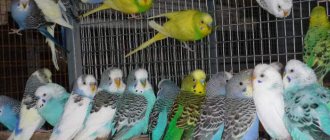Lovebirds make great pets as they are small, active and cheerful birds. Proper feeding will ensure that they feel good. Start by choosing food that is suitable and healthy for these parakeets. You can then create a feeding schedule. It will ensure that your parrots get enough food and nutrients on a regular basis. From our article you will learn what you can feed lovebirds at home. In addition, sometimes in order for the chicks to develop well, they are fed by hand. Although this can be a very time consuming process. We will also tell you further about how to properly feed lovebird chicks.
The nuances of feeding lovebirds
According to ornithologists, it is necessary to combine grain feed with vegetables and fruits.
Details of feeding parrots
But not all fruits are healthy. Products for the poultry menu must be chosen very carefully. Everything they eat in the wild is different from the food they are given in captivity.
Grain mixture
The main food for lovebirds is a grain mixture. It should make up at least 60% of the daily diet. Grain feed can be purchased ready-made, or you can prepare it yourself. Of the ready-made lovebird mixtures, food is only suitable for medium-sized parrots. It is not recommended to use ready-made food for small and large species.
The most common brands of grain mixtures for lovebirds: Rio, Padovan, Fiory, Versele-Laga. You can buy this food at any store.
Before purchasing, you must check the expiration date. The grains must be in sealed packaging. Before feeding, grain must be checked for quality. The surface of the grains should be smooth and glossy, there should be no damage or musty smell.
The grain mixture includes: red, yellow and black millet, oats, wheat, corn, canary seed, rapeseed, sesame, buckwheat, hemp seed, Abyssinian noug, safflower, as well as pieces of dried vegetables and fruits.
The daily norm of grain mixture for lovebirds is 2-3 teaspoons.
Setting a Feeding Schedule
Metabolic processes in birds occur quite intensively. Food is digested and absorbed within 120-180 minutes.
Therefore, parrots constantly need to replenish their supply of nutrients. Even a short period of fasting harms them.
Collectors offer food to breeding birds every 3 hours. In my opinion, this is not necessary. The optimal number of feedings at home is 2, in the morning and before 18:00.
Lovebird feeding schedule
Daily norm
In order for the diet to be balanced and correct, you need to not only know what to feed lovebirds, but also have an idea of the norms for the different components. Different foods must be given in certain proportions so that all the necessary vitamins enter the body of feathered pets.
Proper feeding should be done according to the recommendations below:
- approximately 35 grams of dry grain feed are given per day;
- wet food is given in the amount of 5 grams per day;
- on protein days, wet food is reduced to 2 grams;
- The main food needs to be poured in the evening, and additional food is given during the day.
How to create a complete diet for your pet
The daily menu of lovebirds should include:
Complete diet for a parrot
- sprouted wheat – a source of vitamins B and E (give every day, alternate with barley on a 7/7 day schedule);
- hawthorn berries (I feed thawed fruits, my parrots love them very much);
- fresh corn (if the cob is hard, then it must first be boiled without salt and spices. For 1 pet, one slice 2-2.5 cm wide is enough);
- apples (local ones can be given with the peel; imported ones must be peeled).
It is advisable to change menu components. I add pear, tangerine and orange slices to my diet. In June-August I offer berries: gooseberries, cherries.
During the nesting season, I feed my pets an egg. I boil it hard and grate it on a fine grater, then mix it with carrots. I alternate this dish with low-fat cottage cheese.
In spring, I recommend adding greens and fresh tree branches to the menu.
The more varied the diet, the more vitamins and other nutrients the bird receives. It is advisable to immediately accustom lovebirds to soft food. You cannot give them one grain.
Variety in your parrot's diet
Mineral supplements
During the period of active growth, when changing plumage, during nesting, lovebirds need increased nutrition. Regular food does not contain enough minerals; in addition, not all micro- and macroelements are properly absorbed. To compensate for the lack of nutrients, parrots need mineral supplements:
- sepia (cuttlefish shell);
- chalk;
- bone flour;
- organic sand;
- clay;
- nut and eggshells;
- slaked lime.
Pet stores sell a specially selected Rio mineral mixture for parrots, which includes components for the proper functioning of the digestive system. A hard mineral stone is fixed to the wall of the cage to make it easier for lovebirds to break off pieces.
Fresh vegetables and herbs
I feed my parrots seasonal vegetables:
List of healthy vegetables and herbs for a parrot
- zucchini;
- broccoli;
- cauliflower;
- carrots;
- pumpkin;
- cucumber;
- tomatoes;
- sweet bell pepper (can be with seeds);
- beets;
- radish;
- turnip.
You should not give white cabbage, because it contains substances that provoke irritation of the gastrointestinal tract.
My birds really love celery greens and scalded nettles. I also sometimes offer them some arugula. You can feed parrots with strawberry, clover, and fireweed leaves.
What's prohibited
Some products contain elements that are dangerous to birds. When they enter a parrot's body, they become toxic, which ultimately leads to serious poisoning, and in severe cases can cause the death of the pet. When purchasing food and other additives, you should carefully study the composition on the packaging. If it is not indicated, then it is better to check with the seller or refuse the purchase altogether.
Dangerous products:
- potatoes in any form;
- pepper;
- meat fish;
- cheese;
- oil;
- garlic;
- sorrel;
- sour cream;
- mushrooms;
Branches of oak, lilac, pear, bird cherry and poplar are harmful to parrots. Before serving cherries, plums, peaches and other similar products, the pits should be removed. Food from the human table is also dangerous.
Enriching your diet with fruits and berries
My lovebirds happily eat apples and citrus fruits: tangerines and oranges.
Lovebird eats a tangerine
The fruits recommended by experienced breeders are presented in the table:
| Fruits | Berries |
| Pineapple, bananas, pear (without core), feijoa, kiwi, peach, plum, | Quince, watermelon (seasonal), lingonberry, melon, rose hip, blackberry, strawberry, sea buckthorn, cranberry, blueberry, raspberry, rowan, currant. |
Mango, papaya, and persimmon are not allowed.
What not to feed
The bird must have its own food - this is the rule. The parrot should not be allowed to peck food prepared for people. Fried, fatty, seasoned foods are strictly prohibited for lovebirds. In addition to ready-made food from the common table, birds should not be given spicy vegetables, some fruits and food that is not typical for parrots in nature.
A short list of prohibited products:
- onion, garlic, hot pepper;
- potatoes, eggplant;
- cheese, butter;
- mushrooms;
- seafood;
- bird cherry, sweet cherry, cherry;
- persimmon, avocado.
Important: Salt is contraindicated for lovebirds, but porridge with water is allowed. If you run out of bird food, you can boil fresh pearl barley or buckwheat. Do not season with anything, cool and place one tablespoon of porridge in the feeder.
A varied diet includes all the necessary elements for the health of lovebirds. The use of high-quality mixtures and fractional feeding are the main conditions for the prevention of obesity in poultry. Flavoring and mineral supplements complement the regular diet and contribute to the good mood of the parrots.
What to avoid when feeding poultry
It is prohibited to include in the diet:
- preservatives;
- sugar;
- fats.
Parrots should not eat food from the table - this must be carefully monitored. It is forbidden to feed the bird from the mouth. Human saliva contains dangerous microorganisms that can harm your pet.
Preservatives
Candied fruits and store-bought juices should not be given. Dried apricots, figs, and industrially produced prunes may also contain harmful impurities.
porridge for parrots (basic)
Sugar
The bird gets a sufficient amount of this element from berries and fruits. Exceeding the norm can lead to the development of diabetes.
Occasionally it is allowed to treat your pets with unrefined brown sugar. I give no more than 3-4 crystals per month.
Fats
I do not recommend giving walnuts or cashews. Fermented milk products are allowed, but in strictly limited quantities. Optimal fat content is up to 3%.
I sometimes treat my birds with baby fruit puree without cream, mixed with cottage cheese.
If your pet leads a passive lifestyle, such food should be abandoned.
Choose a high-quality seed mixture that your birds will enjoy eating.
Your task is to find or make your own mixture that has a wide variety of grains. What seeds do lovebirds eat from seeds? Perfect for: millet, canary grass seeds, oatmeal, niger seeds, flax, sunflower, safflower and rapeseed.
Other seed mixtures may contain soybeans, fennel seeds, rye, whole brown rice, sesame and poppy seeds.
- The seeds do not have much nutritional value for lovebirds. Therefore, they are recommended to be given only in very small quantities as treatment. They should never be your bird's only food source.
- Use only fresh seed mixture. If it smells dusty or old, you shouldn't give it to lovebirds.
Feeding the chicks
Very young chicks are fed by their parents. If there are no problems, they don’t pluck or peck at them, then there’s no need to interfere. I recommend giving food to babies using a syringe. The basis of the diet is children's dairy-free porridge.
Parrots up to 3 months eat:
- soft food (carrots with eggs, cottage cheese);
- baby fruit food.
You can add 3 drops of Vita-Sol to your food. You need to be careful with vitamins. Better their lack than their excess.
Feeding Fischer's lovebird chicks
Additional feeding
Lovebirds are herbivorous birds, but they benefit from eating animal food from time to time. In nature, parrots catch insects - the body requires proteins. The owners give their charges boiled chicken eggs, cottage cheese, kefir:
- Adults can be offered a hard-boiled and chopped egg once a week, young ones - twice;
- liquid fermented milk products are served on a spoon;
- cottage cheese 2% fat – 1 tbsp. l. at one time, with a break of at least three days.
Attention! Parrots should not be overfed - when keeping lovebirds at home, there is a high risk of obesity. A bird can eat often, but little by little.
It is especially important what lovebirds are fed when the nesting season begins. If a couple is preparing to become parents, these birds are fed daily until the female sits on her eggs. After hatching the chicks, the female’s body is weakened and exhausted; she needs a vitamin supplement to restore her strength. The veterinary drug Beaphar, Trivit or a little fish oil is dripped into the food.
Clean your pet's beak after feeding
Cleaning helps avoid the accumulation of bacteria and the development of dangerous diseases.
Food for lovebirds part 1
The instructions look like this:
- Soak a soft towel in warm boiled water.
- Carefully handle the chick's beak.
- Wipe your pet’s “face” dry.
The procedure is carried out after each feeding.
Adults clean off food debris on their own. You can make their task easier by purchasing and placing a strong mineral stone in the cage.
Drink
A necessary condition for keeping parrots is that there should always be fresh water in the drinking bowl. Lovebirds can be given bottled or filtered water at room temperature. Plain tap water is quite suitable for parrots, but it must first be soaked until the chlorine evaporates. Boiled water should not be offered to a parrot, since when heated, its structure changes and some of the beneficial properties disappear.
For illnesses, lovebirds are advised to drink herbal tea - a drink that relieves inflammation and calms the nervous system. For infusions you can use dry chamomile and rose hips.
Important: Any liquid must be poured into a clean drinking bowl. When cleaning is done poorly, pathogenic microorganisms appear in containers.
